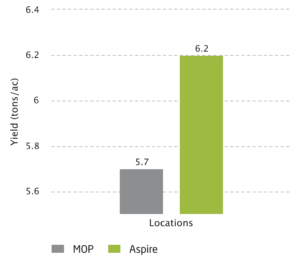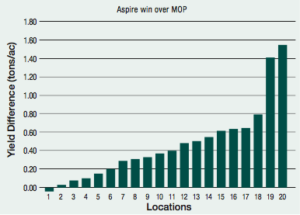OVERVIEW
- MOP is commonly used as a potassium (K) source in alfalfa production.
- In addition to K, alfalfa removes approximately 1.5 oz boron (B) per ton of dry matter.
- Granular B products can be blended with K, but application of these blends often leads to undesirable distribution.
- Aspire® is the first-of-its-kind micronutrientenhanced potash fertilizer. Formed using innovative Nutriform® technology, Aspire® premium potash combines potassium and boron in each granule to help achieve balanced crop nutrition.
TRIAL DETAILS
Locations and Crop Management:
Crop: Alfalfa (Medicago sativa)
Year: 2013-106
Location: 20 trials United States – CA, ID, IL, MN, NY,OH, SD, WI
Data Source: Field studies conducted by third-party, independent researchers.
Experimental Design: Small-plot RCBD with 4 replications.
Cropping Conditions: Trials conformed to local cropping practices and were conducted on an established stand.
P Rate: As required by soil test.
K Rate: 180 lbs K₂O/ac
B Rate: 1.55 lbs B/ac
Application Timing: Directly following first cutting
Application Method: Broadcast
RESULTS


SUMMARY
- Across 20 trials, Aspire® outyielded MOP by 0.5 tons/ac.
- By combining K and B in one granule, Aspire® reduces the risk of uneven application and improves nutrient use for maximum yields.